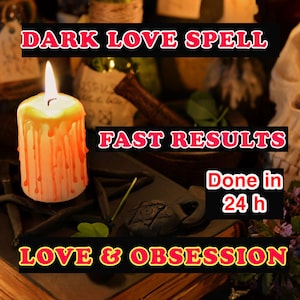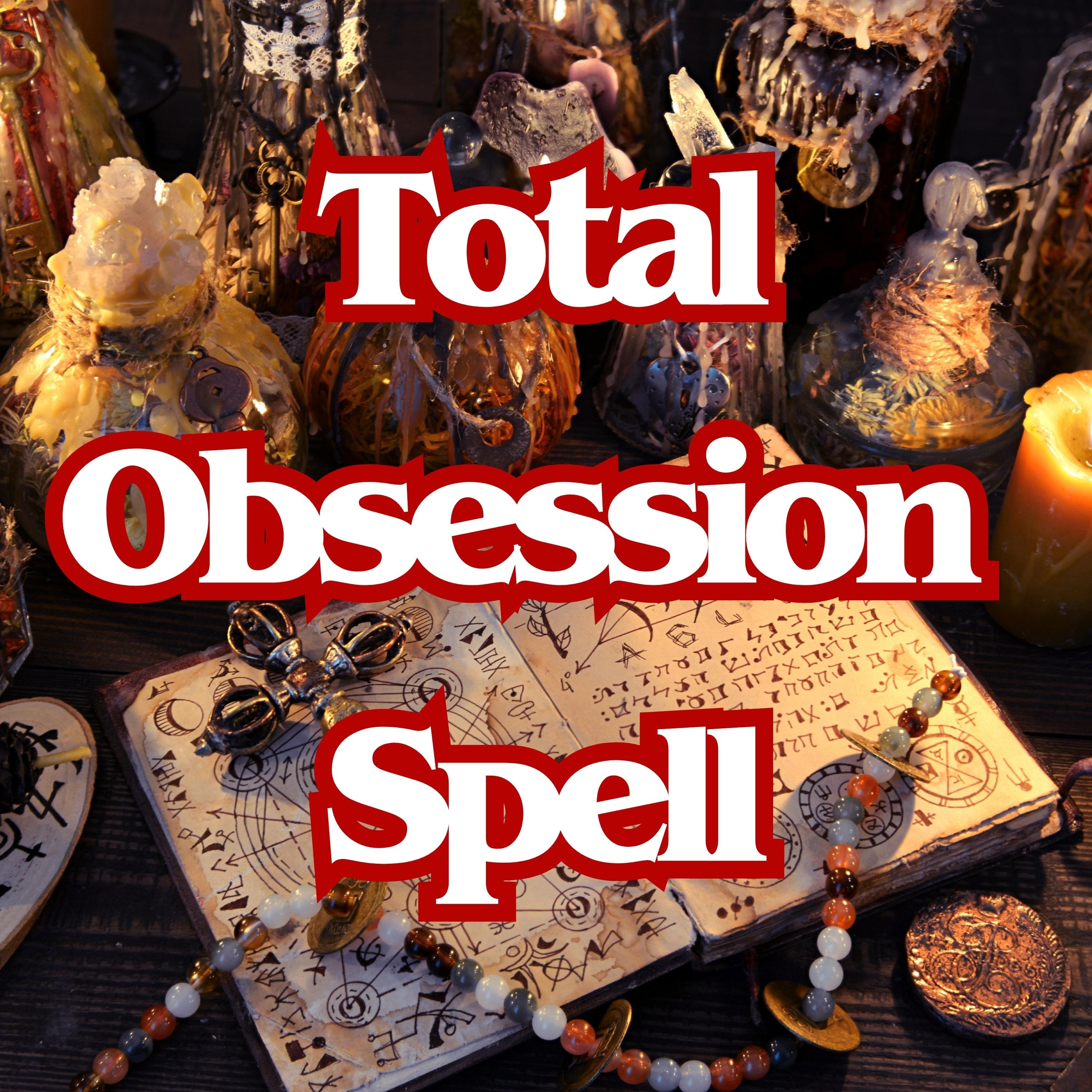- Obsession love spells tap into the power of focused intention and energy alignment to deeply influence emotions, thought patterns, and behaviors.
- Learn to distinguish between healthy passion and unhealthy obsession for balanced relationships.
- Discover the impact of brain chemistry and psychological attachment on love, infatuation, and fixation.
- Find expert guidance on breaking free from destructive obsessions for empowered personal growth.
- Shop real love spells that work and read authentic testimonials from clients who found true love and happiness!
Imagine a force that captures your heart and mind so powerfully, it feels like an unbreakable spell—an energy that drives every thought and desire toward one person or goal.
This is the magnetic power of obsession. It shapes destinies, inspires grand achievements, and, when unchecked, can consume our lives. Whether it's passionate infatuation, unwavering loyalty, or a burning longing to reunite with someone you love, obsession can be both a blessing and a challenge.
Ready to manifest irresistible love or unlock an unbreakable bond?
Shop expert-verified love spells that work
here
—or get your spell cast by the most trusted spell casters in the world. Your happiness starts now!
 The allure and enchantment of a true obsession spell—where energy and desire combine.
The allure and enchantment of a true obsession spell—where energy and desire combine.

What Is Obsession in Love and Magic?
Understanding Obsession: Intense Infatuation or Deep Love?
Obsession is a powerful psychological state where your thoughts, emotions, and actions become fixated on one person, object, or idea. It can feel as though someone has cast a spell over your mind—turning desire and longing into an all-consuming focus.
In the context of love spells and ritual work, obsession can manifest as:
- Intense longing for a specific person
- Unwavering dedication to achieving a romantic goal
- Continuously thinking about and craving contact or reunion
Healthy Passion vs. Harmful Obsession: How to Tell the Difference
Healthy fixation brings joy, inspiration, and motivation—helping you pursue your deepest dreams. But when passion tips into unhealthy obsession, it can cause distress, anxiety, or even damage relationships.
Signs of a healthy vs. unhealthy obsession:
- Healthy: Encourages growth, respect, and mutual care
- Unhealthy: Creates anxiety, possessiveness, and neglect of self or others
The Psychology & Spiritual Roots Behind Obsession
Where Does Obsession Come From?
The roots of obsession often lie deep within our subconscious, shaped by past experiences, emotional wounds, and the desire for safety or validation. Childhood traumas, inconsistent caregiving, or unmet emotional needs can pave the way for obsessive thinking and attachment later in life.
Attachment Theory & Spellwork
According to attachment theory, early bonds with caregivers influence how we seek love as adults. Those with insecure or anxious attachments may rely on obsession as a coping mechanism—using love magic as a spiritual solution for intense longing, validation, or control.
Unresolved trauma and fear of abandonment in childhood can turn innocent crushes into obsessive desires as we search for closure, comfort, or a magical solution.
Obsession & Brain Chemistry: The Spell Within the Mind
How Neurotransmitters Drive Obsession
Obsession isn't just emotional—it's also biological. Imbalances in neurotransmitters like dopamine and serotonin can amplify feelings of longing and fixation.
- Dopamine: This “reward” chemical increases every time you interact with (or just think about) your obsession—reinforcing the behavior like a magical feedback loop.
- Serotonin: Low levels of serotonin are linked to overthinking, anxiety, and obsessive thoughts. Other brain chemicals such as norepinephrine and glutamate can add intensity to obsessive states.
Understanding these brain processes can help target spells and rituals precisely—for love, healing, or personal transformation.
 The soothing, magnetic energies channeled in obsession spell rituals.
The soothing, magnetic energies channeled in obsession spell rituals.
The Power & Influence of an Obsession Love Spell
Transform Passion Into Success Stories
When used wisely, obsession can drive remarkable achievements. Countless inventors, artists, and lovers credit their success to an unstoppable focus, often kindled or supported by magical intention.
But obsession can also lead to destructive or unhealthy patterns if left unchecked.
- Healthy obsession brings motivation, determination, and deep connection.
- Unhealthy obsession, however, can cause sleeplessness, neglect of self-care, and relationship turmoil.
Find your balance with expert-reviewed love spells — see how an Obsession Love Spell can work for you!
Obsession, Love, and Relationships: Drawing the Line
What Is Obsessive Love? Signs & Solutions
In relationships, obsession can manifest as excessive possessiveness, emotional dependency, or constant longing for your partner. Mild obsession can keep passion alive, but it becomes toxic if you lose your sense of self or peace of mind.
Signs of obsessive love:
- Repeatedly checking on your partner
- Frequent jealousy, intrusive thoughts, or emotional outbursts
- Difficulty trusting or accepting time apart
Potential solutions: Seek supportive therapies, open communication—and, where appropriate, energy-cleansing or relationship-focused spells like the Reconciliation Love Spell or Bring Back Lost Lover Love Spell.
Passion or Possessiveness? Find Your Boundaries
Passion binds hearts—possessiveness tightens the leash. Learn to recognize when love empowers both partners, and when control begins to undermine trust.
- Healthy passion is marked by respect, space, and shared joy.
- Possessive obsession brings anxiety, restriction, and fear of loss.
Addressing obsessive tendencies can help you attract and sustain a healthy love. Explore relationship reset spells like Relationship Reset: The Way It Used To Be for renewed balance.
 Obsession love spell talismans and ritual tools channel intention and energy.
Obsession love spell talismans and ritual tools channel intention and energy.
What Clients Are Saying:
⭐⭐⭐⭐⭐ "I ordered the Obsession Love Spell and my partner couldn't stop thinking about me! Thank you, Spellcasters!" — Monique, Johannesburg
⭐⭐⭐⭐⭐ "The Bring Back Lost Lover Love Spell changed my life—he called the next day after weeks of silence. Truly powerful magic!" — Lethabo, Durban
⭐⭐⭐⭐⭐ "If you want real results, trust this team. My relationship reset spell brought honesty and passion back into our marriage." — Sarah, Cape Town
Breaking the Obsession-Compulsion Cycle
The Loop Explained
The obsession-compulsion loop is a potent feedback cycle: Obsessive thoughts create anxiety. Repetitive actions (compulsions)—like checking, texting, or magical rituals—momentarily relieve that anxiety, but ultimately reinforce the obsession.
Strategies to Break the Pattern
Awareness is your first step. Recognizing the loop allows you to:
- Identify triggers
- Practice mindfulness to observe thoughts without judgment
- Utilize healthy distractions and grounding rituals
- Seek support from therapists or experienced spellcasters
 Sacred symbols and colors are used to amplify obsession spell power.
Sacred symbols and colors are used to amplify obsession spell power.
Obsession & Mental Health: When to Seek Support
Obsession as a Symptom
Intense, intrusive thoughts may indicate underlying conditions such as Obsessive-Compulsive Disorder (OCD), anxiety, or depression. If obsession interferes with daily life, relationships, or happiness, professional guidance is crucial.
Obsession can worsen anxiety and depression, making it harder to find peace. Don't hesitate to seek therapy or combine psychological help with tailored love or healing spells for full-spectrum support.
Obsession & Addiction: Understanding the Connection
How Obsession Becomes Addictive
Both obsession and addiction involve cycles of craving, reward, and compulsion—making it challenging to break free on your own. This is especially true in cases of lost love or unattainable desires, which create repetitive thought patterns and emotional responses.
- Recognize addictive cycles of obsessive behavior.
- Use expert rituals and healthy boundaries to restore balance.
For those breaking free from toxic love cycles, try the Binding Love Spell or Banish Them Spell.
How Obsession Shapes Our World
From Personal Longings to Societal Trends
Obsession not only affects individuals—it drives consumerism, materialism, and even social media trends. When desire becomes insatiable, it can lead to burnout, financial strain, or a sense of emptiness.
- Evaluate which obsessions nurture your soul and which drain your happiness.
- Balance ambition and rest for true fulfillment.
Discover love spells for lasting happiness—not just momentary desire. Browse our Love Spells Collection.
Breaking Free from Harmful Obsession
When Is Obsession Harmful?
Ask yourself: Is this obsession interfering with my daily well-being, chaining me to anxiety, or eroding my relationships?
If so, it’s time to seek support — through therapy, healing rituals, or by working with an expert spellcaster. You are never alone on your path!
Practical Steps for Healing
- Bring self-awareness to obsessive thoughts
- Practice daily mindfulness or grounding rituals
- Engage in creative, social, or spiritual outlets (journaling, art, meditation)
- Connect with others for encouragement and support (see below for psychic widget!)
- Explore healing-focused spells like the Mend a Broken Heart Healing Love Spell or Unconditional Love Spell
For expert help and personalized spell casting, visit our Contact page or explore the entire Love Spells Collection.
Break Free from the Spell—Or Make Love Unforgettable.
Whether you long for reunion, passion, or a new beginning, your journey starts here. Unlock true love and lasting happiness with expert spells and support.
Order Your Obsession Love Spell Today
You may also find these spells helpful for love and obsession:
Bring Back Lost Lover Love Spell |
Lust for Me Love Spell |
Reconciliation Love Spell |
Explore All Love Spells
Frequently Asked Questions About Obsession Spells
Most clients begin noticing subtle changes in energy and attention within 7–14 days. Full manifestation can take several weeks, depending on the complexity of the situation and the intended outcome.
Are obsession spells safe to use on someone I love?When performed ethically by an experienced spellcaster, obsession spells focus on manifesting mutual desire and connection, while respecting free will. Always consult with an expert and follow responsible guidelines.
Can obsession spells help bring back a lost lover?Absolutely. Many clients have used obsession spells and Bring Back Lost Lover Love Spells to reignite desire and reunite with loved ones after separation or misunderstandings.
What should I do if obsession becomes harmful?Recognize the warning signs, seek professional counseling, and consider energy-cleansing or healing spells. Never hesitate to ask for support when obsession disrupts your peace or health.
How do I choose the right spell for my situation?Review client testimonials, consult with experienced spellcasters, and explore spell options. Each situation is unique—spells like the Desire Spell or Fall in Love Spell offer tailored outcomes.
How Obsession Love Spells Work: Ritual Steps
- Intent Setting: Clearly focus on your desired outcome (reunion, passion, increased attention, etc.).
- Spell Preparation: Expert spellcasters assemble enchanted items, talismans, and spiritual energy unique to your request.
- Ritual Performance: During a sacred window, your spell is cast—harnessing red candles, incantations, and energy focusing for maximum potency.
- Energy Release & Amplification: Spell energy is sent to you and your beloved, strengthening desire and opening channels.
- Follow-Up: Maintain an open, loving mindset. Many clients add ritual baths, use love attraction oils, or repeat affirmations to further amplify spell results.
Spellcaster Belinda — With over 20 years of experience in psychic guidance, spiritual healing, and professional spell casting, Belinda has helped thousands transform their love lives through compassionate energy work and ethical obsession love spells. She is dedicated to creating positive relationships and empowering true connection.





